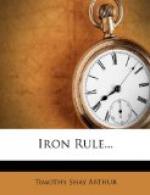“What shall I do with the boy!” was the despairing exclamation of Mr. Howland, when this event occurred. “Idleness will complete his ruin, and he is too young to put out.”
“I will send him to sea,” was the final conclusion of his mind, after debating the matter for some days, and talking with several friends on the subject. Mr. Howland was generally in earnest when he decided a matter, and but little given to change his purposes. And he was in earnest now. But the moment his intention was announced to his wife, there came from her an unexpected and vigorous opposition.
“No, Andrew,” said she, with an emphasis unusual to her in addressing her husband, “that must not be.”
“I tell you it must be, Esther,” quickly replied Mr. Howland. “Nothing else will save the boy.”
“It lacks only that to complete his ruin,” said Mrs. Howland, firmly. “Never, Andrew—never will he go on board of a vessel with my consent.”
And the mother burst into tears.
“I don’t wish to have any contention about this matter, Esther,” said Mr. Howland, gravely, as soon as his wife had grown calm, “and I don’t mean to have any. But I wish you to understand that I am in earnest. Being fully satisfied that the last hope for Andrew is to send him to sea, I have fully made up my mind to do it. I have already spoken to the captain of a vessel trading to South America. A few months on ship-board will tame him. He’ll be glad enough to behave himself when be gets home.”
“I have no faith in this remedy,” replied Mrs. Howland, somewhat to the surprise of her husband, who expected to silence her, as usual, with his broadly asserted ultimatum. “Severe remedies have been tried long enough. In my view, a milder course pursued toward the boy would effect more than any other treatment.”
“Mildness! Haven’t we tried that, over and over again? And hasn’t it only encouraged him to bolder acts of disobedience?”
Mrs. Howland sighed. Her mind went back to the past, but none of these instances of mild treatment could she remember. The iron hand had been on him from the beginning, crushing out the good, and hardening the evil into endurance.
“Andrew,” said she, after sitting for some time with her eyes upon the floor, speaking in a very calm voice, “he is my son as well as yours—and his welfare is as dear to me as it is to you. As his mother, I am entitled to a voice in all that concerns him; and now, in the sight of heaven, I give my voice distinctly against his being sent to sea.”
Mr. Howland seemed startled at this bold speaking in his wife, which, to him, amounted to little less than rebellion against his authority. As the head of the family, it was his prerogative to rule; and he had ruled for years with almost undisputed sway. Not in the least inclined did he feel to give up now, the power which he believed, of right, belonged to him. A sharp retort trembled for a moment on his lips; but he kept back its utterance. He did not, however, waver a single line from his purpose, but rather felt it growing stronger.




